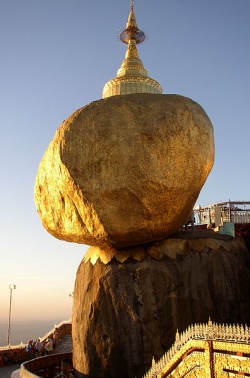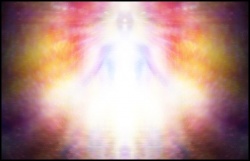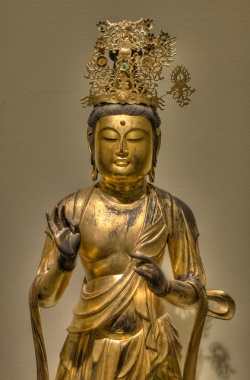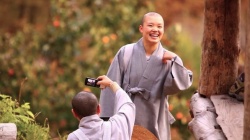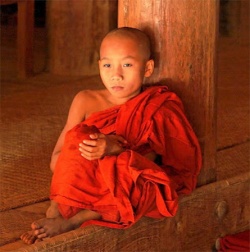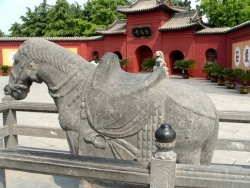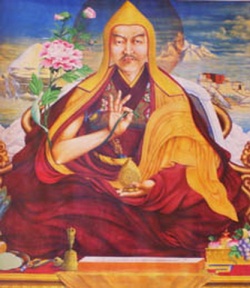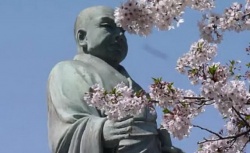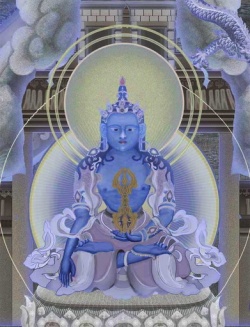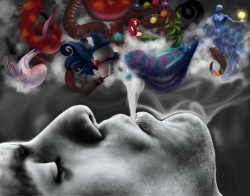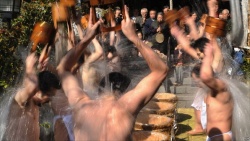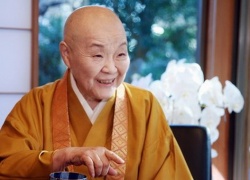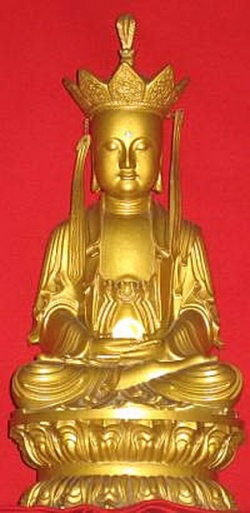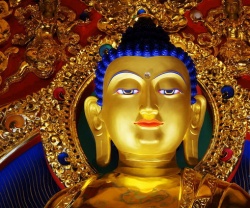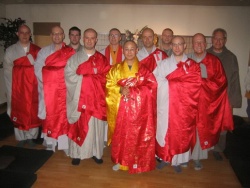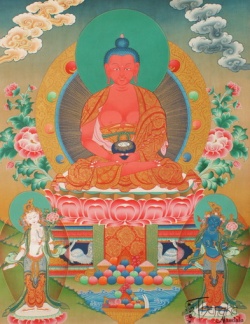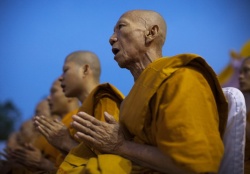Flower Adornment Sutra: The Ten Inexhaustible Treasuries
The Great Means Expansive Buddha Flower Adornment Sutra
Chapter Twenty-Two
The Ten Inexhaustible Treasuries
Translated in the Tang Dynasty by the Tripitaka Master Shramana Shikshananda of Khotan
At that time, Forest of Merit and Virtue Bodhisattva further told all the Bodhisattvas, “Disciples of the Buddha, Bodhisattva Mahasattvas have ten kinds of treasuries which all the Buddhas of the past have spoken about, all the Buddhas of the future will speak about, and all the Buddhas of the present are speaking about.”
“What are the ten? They are the Treasury of Belief, the Treasury of Precepts, the Treasury of Shame, the Treasury of Remorse, the Treasury of Learning, the Treasury of Giving, the Treasury of Wisdom, the Treasury of Mindfulness, the Treasury of Upholding, and the Treasury of Eloquence. Those are the ten.”
I. The Treasury of Belief
“Disciples of the Buddha, what is the Bodhisattva Mahasattvas’ Treasury of Belief?”
“These Bodhisattvas believe that all Dharmas are empty. They believe that all Dharmas are without an appearance. They believe that all Dharmas are wishless. They believe that all Dharmas are without creation. They believe that all Dharmas are without distinctions. They believe that all Dharmas are without reliance. They believe that all Dharmas are not able to be measured. They believe that all Dharmas are Unsurpassed. They believe that all Dharmas are difficult to transcend. They believe that all Dharmas are without production.”
“If Bodhisattvas can accord with all Dharmas in this way, then after they give rise to pure belief, when they hear that all Buddhadharmas are inconceivable, their minds are not afraid. When they hear that all Buddhas are inconceivable, their minds are not afraid. When they hear that the realm of living beings is inconceivable, their minds are not afraid. When they hear that the Dharma Realm is inconceivable, their minds are not afraid. When they hear that the realm of empty space is inconceivable, their minds are not afraid. When they hear that the realm of Nirvana is inconceivable, their minds are not afraid.”
“When they hear that the past is inconceivable, their minds are not afraid. When they hear that the future is inconceivable, their minds are not afraid. When they hear that the present is inconceivable, their minds are not afraid. When they hear that entering every kalpa is inconceivable, their minds are not afraid.”
“Why not? These Bodhisattvas, residing in the places of Buddhas, have thoroughly solid faith. They know that the Buddhas’ wisdom is boundless and inexhaustible. In each and every one of the limitless worlds of the ten directions, there are limitless Buddhas who have already attained, are now attaining, or will attain Anuttarasamyaksambodhi. They have already come into the world, are now coming into the world, or will come into the world. They have already entered Nirvana, are now entering Nirvana, or will enter Nirvana. The wisdom of these Buddhas does not increase, does not decrease; is not produced, is not destroyed; does not progress, does not retreat; is not near, is not far; is without knowing and without rejecting.”
“These Bodhisattvas enter into the Buddhas’ wisdom and accomplish boundless, inexhaustible belief. After they attain this belief, their minds do not retreat. Their minds do not become scattered or confused. They are indestructible and undefiled. They always have a foundation. They accord with sages, and dwell in the household of the Thus Come Ones.”
“They protect the seed nature of all Buddhas. They increase the faith and understanding of all Bodhisattvas. They comply with all Thus Come Ones’ good roots, and they give rise to the expedients of all Buddhas.”
“This is called the Bodhisattva Mahasattvas’ Treasury of Belief.”
“When Bodhisattvas dwell in this Treasury of Belief, they can hear and uphold all the Buddhadharma, speak it for living beings, and enable them to become enlightened.”
II. The Treasury of Precepts
“Disciples of the Buddha, what is the Bodhisattva Mahasattvas’ Treasury of Precepts? These Bodhisattvas accomplish precepts which are universally beneficial, precepts of non-reception, precepts of non-dwelling, precepts of being without regret, precepts of being without contention, precepts of never harming, precepts of being without defilement, precepts of being without greed or seeking, precepts of never making mistakes, and precepts of never making violations.”
“What are the precepts which are universally beneficial? These Bodhisattvas receive and uphold pure precepts for the fundamental reason of benefitting all living beings.”
“What are the precepts of non-reception? These Bodhisattvas do not receive or practice any of the precepts of external paths. Of their own nature they are vigorous, and they respectfully uphold the equal and pure precepts of all Buddhas, Thus Come Ones, throughout the three periods of time.”
“What are the precepts of non-dwelling? When these Bodhisattvas receive and uphold precepts, their minds do not dwell in the desire realm, they do not dwell in the form realm, and they do not dwell in the formless realm. Why not? Because they do not uphold the precepts with the hope of being born in those places.”
“What are the precepts of being without regret? These Bodhisattvas always rest in thoughts free from remorse or regret. Why? Because they do not commit heavy offenses, they do not practice flattery or deceit, and they do not break the pure precepts.”
“What are the precepts of non-contention? These Bodhisattvas do not criticize what is already established, how much the less try to set things up their own way. Their minds are always in accord with precepts that tend toward Nirvana, completely receiving and upholding them and not violating them. Nor do they use precepts as a way to disturb other beings, causing them to give rise to suffering. It is only because they want everyone to always be happy that they uphold the precepts.”
“What are the precepts of never harming? These Bodhisattvas do not rely on precepts to study deceptive mantras or create potions in order to harm living beings. It is only for the sake of rescuing and protecting living beings that they uphold the precepts.”
“What are the precepts of being without admixture ? These Bodhisattvas do not attach to prejudiced views nor do they hold a mixture of precepts. They only contemplate the arisal of conditions and uphold world-transcending precepts.”
“What are the precepts of being without greed or seeking? These Bodhisattvas do not manifest strange appearances or display their own virtue. It is only for the sake of perfecting the Dharmas of escape that they hold the precepts.”
“What are the precepts of never erring? These Bodhisattvas do not aggrandize themselves and say, ‘I hold precepts.’ When they see people who have violated precepts, they do not slight or slander them or cause them to feel remorseful, but they simply singlemindedly hold the precepts.”
“What are the precepts of never making violations? These Bodhisattvas have eternally severed killing, stealing, sexual misconduct, false speech, double-tongued speech, harsh speech, unprincipled speech, greed, hatred, and deviant views. They thoroughly uphold the ten good deeds. When those Bodhisattvas uphold these precepts of never making violations, they have this thought, ‘All living beings violate the pure precepts because they are upside down. Only the Buddhas, World Honored Ones, can know the causes and conditions that make living beings upside down so they violate the pure precepts. I should accomplish Unsurpassed Bodhi and extensively proclaim true and actual Dharmas for living beings so they can separate from being upside down.’”
“This is called the Bodhisattva Mahasattvas’ Second Treasury, that of Precepts.”
III. The Treasury of Shame
“Disciples of the Buddha, what is the Bodhisattva Mahasattvas’ Treasury of Shame?”
“These Bodhisattvas remember the evil they did in the past and they give rise to shame.”
“Which is to say, they themselves reflect, ‘from beginningless time onward, we and all living beings have mutually been one another’s father, mother, older brother, younger brother, older sister, younger sister, son, and daughter. But because we are filled with greed, hatred, and stupidity, arrogance and deceptiveness, and all sorts of other afflictions, we have also mutually hurt one another and reciprocally exploited one another.”
“We have lusted, raped, injured, and killed. There is no evil we have not committed. It is this way for all beings. Based on their afflictions, they double their manifold evils. For this reason, among everyone there is no mutual respect, no mutual veneration, no mutual compliance, no mutual humility, no mutual guidance, and no mutual regard, rather there is a furthering of mutual killing and harming, so that everyone becomes revengeful enemies.”
“They themselves consider, ‘We personally, as well as all living beings are shameless about our past, future, and present behavior, yet there is not a single deed which the Buddhas of the three periods of time do not know and see. So now, if we do not cut off this shameless behavior, the Buddhas of the three periods of time will continue to see us. How could we possibly not stop acting like this? There is no way we cannot stop! Therefore we should singlemindedly sever and get rid of such behavior and become certified to Anuttarasamyaksambodhi, so that we can expansively speak true and actual Dharma for living beings.’”
“This is called the Bodhisattva Mahasattvas’ Third Treasury, that of shame.”
IV. The Treasury of Remorse
“Disciples of the Buddha, what is the Bodhisattva Mahasattvas’ Treasury of Remorse?”
“These Bodhisattvas themselves are remorseful that in the past they indulged in greedily seeking the five desires without weariness or satiation. Because of this, their greed, hatred, and stupidity and various other afflictions increased. ‘I should not do these things anymore,’ is their thought. They continue to reflect, ‘Living beings lack wisdom and give rise to afflictions. They all practice evil dharmas and are not mutually respectful or courteous, even to the point that they become revengeful enemies. There is no evil of any sort which they do not engage in full-force. Having engaged in it, they are happy and seek for praise.’”
“‘They are blind without the wisdom eye and have no knowledge or vision. From their mother’s belly, they enter the womb and are born with an unclean body.’” “‘In the end, their hair turns white and their faces get wrinkled. Those with wisdom contemplate this and see that this solely comes about from the impurity of sexual desire.’”
“‘The Buddhas of the three periods of time all know and see this. If I continue to act like this, then I am just trying to deceive the Buddhas of the three periods of time.’”
“‘Therefore, I should cultivate a sense of remorse, quickly accomplish Anuttarasamyaksambodhi, and extensively speak true and actual Dharma for the sake of living beings.’”
“This is called the Bodhisattva Mahasattvas’ Fourth Treasury, that of Remorse.”
V. The Treasury of Learning
“Disciples of the Buddha, what is the Bodhisattva Mahasattvas’ Treasury of Learning? These Bodhisattvas know that because some phenomena exist, other phenomena exist; that because some phenomena do not exist, other phenomena do not exist; that because some phenomena arise, other phenomena arise; that because some phenomena cease to be, other phenomena cease to be; whether they are mundane dharmas, transcendental dharmas, conditioned dharmas, unconditioned dharmas, determinate dharmas, or indeterminate dharmas.”
“What are the phenomena which exist because other phenomena exist? For instance, activity exists because ignorance exists. What are phenomena which do not exist because other phenomena do not exist? For instance, name and form do not exist when consciousness does not exist. What are phenomena which arise because other phenomena arise? For instance, suffering arises because emotional love arises. What are phenomena which cease to be because other phenomena cease to be? For instance, birth ceases to be when becoming ceases to be.”
“What are mundane dharmas? They are for instance, form, feeling, thinking, activity, and consciousness. What are transcendental dharmas? They are for instance, precepts, samadhi, and wisdom, liberation, and liberation of knowledge and views.”
“What are conditioned dharmas? They are for instance, the realm of desire, the form realm, the formless realm, and the realm of living beings. What are unconditioned dharmas? They are for instance, emptiness, nirvana, the extinction involving reckoning of conditions, the extinction not involving reckoning of conditions, arisal from conditions and dwelling in the Dharma nature.”
“What are determinate dharmas? They are for instance, The Four Holy Truths, the Four Fruits of a Shramana, the Four Eloquences, the Four Fearlessnesses, the Four Applications of Mindfulness, the Four Right Efforts, the Four Spiritual Fulfillments, the Five Roots, the Five Powers, the Seven Shares of Enlightenment, and the Eight Sagely Way Shares.”
“What are indeterminate dharmas? They are for instance, whether worlds are bounded, whether worlds are boundless, whether worlds are both bounded and boundless, whether worlds are neither bounded or boundless; whether worlds are permanent, whether worlds are impermanent, whether worlds are both permanent and impermanent, whether worlds are neither permanent nor impermanent; whether Thus Come Ones exist after extinction, whether Thus Come Ones do not exist after extinction, whether Thus Come Ones both exist and do not exist after extinction, whether Thus Come Ones neither exist nor do not exist after extinction; whether a self and living beings exist, whether a self and living beings do not exist, whether a self and living beings both exist and do not exist, whether a self and living beings neither exist nor do not exist.”
“How many Parinirvanas of Thus Come Ones and how many Parinirvanas of Sound Hearers and Pratyekabuddhas have there been in the past? How many Buddhas, Sound Hearers, Pratyekabuddhas and living beings will there be in the future? How many Buddhas, Sound Hearers, Pratyekabuddhas, and living beings are there at present? Which Thus Come Ones first appeared in the world? Which Sound Hearers and Pratyekabuddhas first appeared in the world? Which living beings first appeared in the world? Which will be the last Thus Come Ones to dwell in the world? Which will be the last Sound Hearers and Pratyekabuddhas to appear in the world? Which will be the last living beings to dwell in the world? Which dharma first came to be, and which dharma will be the last? Where did worlds come from, and to what places will worlds go? How many world systems have arisen, and how many world systems have been destroyed? Where have world systems come from, and where do they go to? What is the boundary of before birth and death, and what is the boundary of after birth and death? These are called indeterminate dharmas.”
“The Bodhisattva Mahasattvas have this thought, ‘All living beings in the midst of birth and death lack learning and cannot understand all these dharmas. I should resolve to uphold the Treasury of Learning and become certified to Anuttarasamyaksambodhi, and for the sake of living beings speak true and actual Dharma.’ This is called the Bodhisattva Mahasattvas’ Fifth Treasury, that of learning.”
VI. The Treasury of Giving
“Disciples of the Buddha, what is the Bodhisattva Mahasattvas’ Treasury of Giving? These Bodhisattvas practice ten kinds of giving. They are, giving by reducing one’s portion, exhaustive giving, the giving of inner wealth, the giving of outer wealth, the giving of inner and outer wealth, total giving, past giving, guture giving, present giving, and ultimate giving.”
- Giving by Reducing One’s Portion
“Disciples of the Buddha, what is the Bodhisattvas’ Giving by Reducing One’s Portion? These Bodhisattvas who are humane and compassionate by nature, well practice giving. If they obtain delicious food, they do not keep it for themselves, but offer it to living beings and afterwards eat a portion. It is the same with all material objects they receive.”
“When they themselves eat, they have this thought: ‘In my body there are eighty thousand worms who rely on me to live. When my body is full and content, they are full and content. When my body is suffering from hunger, they also suffer from hunger. I now accept all of this food and drink with the hope that all living beings will be full. It is in order to give that I take this food. I am not greedy for it’s flavors.’”
“They also have this thought; ‘Throughout the long night of time, I have been lovingly attached to my body and have partaken of food and drink from a desire to fill it up. Now I use the nourishment from this food as a gift to living beings and vow to eternally cut off greed and attachment with regard to my body.’ This is called Giving by Reducing One’s Portion.”
- Exhaustive Giving
“What is the Bodhisattvas’ Exhaustive Giving? Disciples of the Buddha, these Bodhisattvas obtain all kinds of supremely flavored food and drink, fragrant flowers, clothes, and provisions of life. Were they to use these things themselves, they would be peaceful, happy, and long-lived. If they deny themselves and give to others, then they will be poor, miserable, and die young.”
“If at that time, a person comes and says, ‘You should give everything you have to me,’ The Bodhisattva says to himself, ‘From beginningless time to the present, because of starvation, I have lost my body countless times, yet I never did even a hair’s worth of benefit for living beings that would have been of wholesome benefit to me as well. Now, I should, as those before me have done, renounce my life in order to benefit living beings. According to what I own, I should renounce everything—even my very life—without any stinginess.’ This is called Exhaustive Giving.”
- The Giving of Inner Wealth
“What is the Bodhisattvas’ giving of inner wealth? Disciples of the Buddha, suppose a Bodhisattva is youthful and robust, upright and handsome, clothed in fine garments and adorned with fragrant flowers, having just received anointment on the crown of his head to make him a wheel turning king, and who is replete with the seven jewels and ruling over the four continents. Suppose he is approached by a person who addresses his lordship, ‘Oh, great king know that I am now old and decrepit, plagued with many illnesses, friendless, childless, emaciated, and eccentric. My death is not far off. If I had the king’s body, hands, feet, blood, flesh, head, eyes, bones, and marrow, I could go on living. I pray that the king will not be calculating or stingy, but will look upon me with kind thoughts and give himself to me.’”
“At that time, the Bodhisattva says to himself, ‘In the future my physical body must also die and will be of no benefit to anyone. It is fitting that I should immediately relinquish it to save living beings.’ Having had this thought, he gives himself away without any regrets. This is called The Giving of Inner Wealth.”
- The Giving of Outer Wealth
“What is the Bodhisattvas’ giving of outer wealth? Disciples of the Buddha, suppose a Bodhisattva is in his prime, full-featured, replete with the multitude of marks, and clothed in garments of superb elegance. He has just received anointing of the crown and been inaugurated as a Wheel Turning King. He is replete with the Seven Jewels and rules over the Four Continents. Suppose he is approached by a person who addresses his lordship saying, ‘I am poverty stricken and oppressed by a multitude of sufferings. I only hope that the humane one will especially let fall his kindness, relinquish his royal position, and bequeath it to me. Then I can be in command and enjoy the blessings of a king.’”
“At that time, the Bodhisattva thinks like this: ‘All that is glorious will pass away, and when it is gone I will be unable to further benefit living beings. It is fitting that I fulfill his wishes.’ Having had this thought he gives him everything without any regret. This is called the giving of outer wealth.”
- The Giving of Inner and Outer Wealth
“What is called the giving of inner and outer wealth? Disciples of the Buddha, suppose a Bodhisattva such as described above, who has the position of a Wheel Turning King, is replete with the Seven Jewels, and rules over the Four Continents, is approached by someone who says: ‘This position of Wheel Turning King that the King inherited long ago is something I have never had. I only wish, oh Great King, that you would relinquish it to me and that you, Your Majesty, would become my servant.’”
“At that time, the Bodhisattva thinks to himself, ‘My body, wealth, and gems, as well as the royal position, are all dharmas which are impermanent and destined to decay. I am now in my prime and my riches encompass all under heaven. Since this beggar has come forth, I will use what is insubstantial to seek a substantial dharma.’ Having thought thus, he gives everything over to that person, and with his own body, respectfully and diligently serves him. His mind harbors no regret, this is called the giving of inner and outer wealth.”
- Total Giving
“What is meant by a Bodhisattva’s total giving? Disciples of the Buddha, as before, this Bodhisattva inherits the position of a Wheel Turning King, is replete with the Seven Jewels, and rules over the Four Continents. At one time, limitless poverty-stricken people approached him and said, ‘Great King, your renown pervades and is heard throughout the ten directions. Out of veneration we have come. We each have certain things we would like and we hope that you will be compassionate and fulfill our wishes.’ Then the poor people begged variously of the king: Some asked for his country, some wanted his wives or children, some wished for his hands and feet, some wanted his blood, flesh, heart, lungs, head, eyes, marrow, and brains. The Bodhisattva at that time, had this thought: ‘I will eventually have to part from all those for whom I have fondness and love, but it will have been of no benefit to living beings. Now, with the hope of forever casting out greed and emotional love, I will use all of these things that are destined to disperse, to fulfill these living beings’ wishes.’”
“Having had this thought, he bestowed upon them all the things they wanted, without any thoughts of regret, nor any sense of repulsion or contempt toward those living beings. This is called total giving.”
- Past Giving
“What is the Bodhisattva’s past giving? When these Bodhisattvas hear about the merit and virtue of the Buddhas and Bodhisattvas of the past, they do not become attached. They understand its lack of existence. They do not give rise to discriminations. They are not greedy for it, not obsessed by it, and they do not grasp or seek it. They are without a place of reliance. They see dharmas as being like a dream, devoid of any solid substance. They do not give rise to thoughts about good roots, nor do they rely on them. It is only for the sake of teaching and transforming that they cling to living beings. They become perfected in the Buddhadharma and then proclaim it.”
“Moreover, they further contemplate all past dharmas and realize that even when they are sought throughout the ten directions, they cannot be got at. Having had this thought, they completely relinquish all past dharmas. This is called past giving.”
- Future Giving
“What is the Bodhisattva’s future giving? When these Bodhisattvas hear how all future Buddhas will cultivate, they understand their lack of existence. They do not grasp at appearances. They take no special delight in getting reborn in any Buddhaland. They are not obsessed or attached, and they do not give rise to weariness. They do not use their good roots to transfer to them, nor do they because of them, retreat from their good roots.”
“They are constant and diligent in their cultivation, never renouncing it. It is only because they wish to gather in living beings that they make use of such states, so they speak for them what is true and actual and cause them to become mature within the Buddhadharma. And yet these Dharmas do not exist in any location, nor do they lack a location. They are not inside, not outside, not near and not far. They also have this thought: ‘If Dharmas do not exist, then I cannot fail to renounce them.’ This is called future giving.”
- Present Giving
“What is the Bodhisattva’s present giving? These Bodhisattvas hear about the amount of merit and virtue the gods in the heaven of the Four Heavenly Kings are replete with, as well as those in the Heaven of the Thirty-Three, the Suyama Heaven, the Tushita Heaven, the Heaven of the Transformation of Bliss, the Heaven of the Comfort From Others’ Transformations, The Heavens of Brahma—the Brahma Body Heaven, the Heaven of the Ministers of Brahma, the Heaven of the Multitudes of Brahma, the Great Brahma Heaven, the Heavens of Light—the Lesser Light Heaven, the Limitless Light Heaven, the Light-Sound Heaven, The Heavens of Purity—the Heaven of Lesser Purity, the Heaven of Limitless Purity, the Heaven of Pervasive Purity; the Heavens of Abundance—the Heaven of Lesser Abundance, the Heaven of Limitless Abundance, the Heaven of Abundant Fruit; the Heaven of No Afflictions, the Heaven of No Heat, the Good View Heaven, the Good Manifestation Heaven, the Heaven of Ultimate Form, and so forth, up to and including Sound Hearers and Those Enlightened to Conditions, who are replete with merit and virtue. After hearing about this, their minds are neither confused nor depressed, nor do they become obsessed by or scattered by all of this. They merely contemplate all practices as being like a dream that lacks any reality, and they have no greed or attachment toward them. It is for the sake of causing living beings to renounce and leave the evil destinies, to have their minds become free from discriminations, to cultivate the Bodhisattva Path and accomplish the Buddhadharmas, that they speak and explain. This is called present giving.”
- Ultimate Giving
“What is the Bodhisattva’s ultimate giving? Disciples of the Buddha, suppose there were living beings who perhaps had no eyes, or no ears, or no noses or tongues, or no hands and feet, who came to where the Bodhisattva was and said, ‘My body is defective, my faculties are maimed and incomplete. I only wish the humane one would compassionately use expedient means and relinquish what he has in order to make me whole and perfect.’ When the Bodhisattva hears this he immediately gives in this way, and if because of this he must pass through asamkhyeyas of kalpas with incomplete faculties, still his mind never gives rise to a thought of regret.”
“He only contemplates that from the time he entered the womb he had an unclean form. He reflects on how the fetus, which takes shape and develops sense organs, is subject to birth, old age, sickness, and death. He also contemplates the body as unreal, that it is shameless, and not a thing which is sagely or holy. It smells, is filthy and unclean. It is supported by bones and joints, and smeared with blood and flesh. The nine apertures constantly flow with impurities. It is that which people loathe and despise. Having contemplated in this way, he does not give rise to a single thought of love or attachment regarding it.”
“He also has this thought: ‘This body is fragile and not solid, so why should I be fond of or attached to it? I should give to all those people, to fulfill their wishes. I do this to instruct and guide living beings, to cause them to not be greedily attached to their bodies and minds, so they can all become accomplished in the pure wisdom body.’ This is called ultimate giving.”
“This is the Bodhisattva Mahasattvas’ Sixth Treasury, that of Giving.
VII. The Treasury of Wisdom
“Disciples of the Buddha, what is the Bodhisattva Mahasattvas’ Treasury of Wisdom? These Bodhisattvas have a true knowledge of form, a true knowledge of the accumulation of form, a true knowledge of the extinction of form, and a true knowledge of the path that leads to the extinction of form.”
“They have a true knowledge of feeling, thinking, activity, and consciousness; a true knowledge of the accumulation of feeling, thinking, activity, and consciousness; a true knowledge of the extinction of feeling, thinking, activity, and consciousness; and a true knowledge of the path that leads to the extinction of feeling, thinking, activity, and consciousness.”
“They have a true knowledge of ignorance, a true knowledge of the accumulation of ignorance, a true knowledge of the extinction of ignorance, and a true knowledge of the path that leads to the extinction of ignorance. They have a true knowledge of craving, a true knowledge of the accumulation of craving, a true knowledge of the extinction of craving, and a true knowledge of the path that leads to the extinction of craving.”
“They have a true knowledge of Sound Hearers, a true knowledge of the Dharmas of Sound Hearers, a true knowledge of the Accumulation of Sound Hearers, and a true knowledge of the Nirvana of Sound Hearers.”
“They have a true knowledge of Solitarily Enlightened Ones, a true knowledge of the Dharmas of Solitarily Enlightened Ones, a true knowledge of the Accumulation of Solitarily Enlightened Ones, and a true knowledge of the Nirvana of Solitarily Enlightened Ones.”
“They have a true knowledge of Bodhisattvas, a true knowledge of the Dharmas of Bodhisattvas, a true knowledge of the Accumulation of Bodhisattvas, and a true knowledge of the Nirvana of Bodhisattvas.”
“What do they know? They know that they are brought about from causes, conditions, and karmic retribution of all activities. Everything is empty, false, and devoid of actuality. There is no self and nothing substantial. There is not the slightest Dharma which can be established.”
“Wishing to cause living beings to know the actual nature of Dharmas, they speak expansively. What do they speak about? They say that all Dharmas cannot be destroyed. What Dharmas cannot be destroyed? Form cannot be destroyed; feeling, thinking, activity, and consciousness cannot be destroyed. Ignorance cannot be destroyed. The Dharmas of Sound Hearers cannot be destroyed. The Dharmas of Solitarily Enlightened Ones cannot be destroyed. And the Dharmas of Bodhisattvas cannot be destroyed.”
“Why is this? It is because all Dharmas are not created. They have no creator. They cannot be expressed. They have no location. They are not produced. They do not arise. They do not give. They do not take. They do not move or turn. And they have no function. Bodhisattvas accomplish such a treasury of limitless wisdom.”
“From a few expedient means they understand all Dharmas. They naturally comprehend without others enlightening them.”
“There are ten reasons why this treasury of inexhaustible wisdom is known as inexhaustible.”
“What are the ten? They are: It is inexhaustible because they are learned and skillful. It is inexhaustible because they draw near good and wise advisors. It is inexhaustible because they are well able to discern the meanings of phrases. It is inexhaustible because they have entered the depths of the Dharma Realm. It is inexhaustible because they use the wisdom of a single flavor to adorn themselves. It is inexhaustible because they accumulate blessings and virtue without becoming weary at heart. It is inexhaustible because they enter all Dharani doors. It is inexhaustible because they can well discriminate all living beings’ languages, words, voices, and sounds.”
“It is inexhaustible because they can sever all of living beings’ doubts and delusions. It is inexhaustible because they manifest all Buddhas’ spiritual powers for the sake of all living beings, in order to teach and transform, tame and subdue them, and cause them to cultivate without interruption. These are the ten.”
“This is the Bodhisattva Mahasattvas’ Seventh Treasury, that of Wisdom. Those who abide in this treasury obtain inexhaustible wisdom and are universally able to enlighten all living beings.”
VIII. The Treasury of Mindfulness
“Disciples of the Buddha, what is the Bodhisattva Mahasattvas’ Treasury of Mindfulness? These Bodhisattvas cast aside and separate from all stupidity and delusion, and become replete with mindfulness. They remember the past one life, two lives, up to ten lives, a hundred lives, a thousand lives, a hundred thousand lives, limitless hundreds of thousands of lives; the coming into being of kalpas, the decay of kalpas, the arising and decay of kalpas—not just the arising of one kalpa, not just the decay of one kalpa, not just the arising and decay of one kalpa—but a hundred kalpas, a thousand kalpas, a hundred thousand million nayutas, up to countless, limitless, boundless, unequalled, incalculable, inexpressible, inconceivable, immeasurable, ineffable, ineffably ineffable kalpas.”
“They remember one Buddha’s name, up to the names of ineffably ineffable Buddhas. They remember one Buddha’s coming into the world and giving a prediction, up to ineffably ineffable Buddhas’ coming into the world and giving of predictions.”
“They remember one Buddha coming into the world and speaking Sutras, up to ineffably ineffable Buddhas coming into the world and speaking Sutras. As it is with Sutras, so is it with Geyas, bestowal of predictions, Gathas, The Nidanas, Udanas, past lives, this life, Vaipulya, that which has never been before, analogies, and discourses.”
“They remember one assembly, up to ineffably ineffable assemblies. They remember the explanation of one Dharma, up to the explanation of ineffably ineffable Dharmas.”
“They remember the various aspects of one faculty, up to the various aspects of ineffably ineffable faculties. They remember the limitless various aspects of one faculty, up to the limitless various aspects of ineffably ineffable faculties. They remember the various aspects of one affliction, up to the various aspects of ineffably ineffable afflictions. They remember the various aspects of one samadhi, up to the various aspects of ineffably ineffable samadhis.”
“These kinds of mindfulness are of ten kinds. They are: Mindfulness which is still and quiet. Mindfulness which is pure. Mindfulness which is not turbid. Mindfulness which is bright and penetrating. Mindfulness which is apart from defilement. Mindfulness which is apart from various defilements. Mindfulness which is apart from filth. Mindfulness which is bright and dazzling. Mindfulness which is pleasing, and mindfulness which is free from obstacles.”
“When the Bodhisattvas dwell in these mindfulnesses, nothing in the world can disturb or unsettle them. No strange theories can move them. Their good roots from past lives are made pure and they are not defiled by or attached to any dharma in the world. The multitudes of demons and those of external ways cannot destroy them. They can undergo rebirth and receive different bodies without any lapse in memory. They proclaim the Dharma endlessly throughout the past, present, and future.”
“They abide together with living beings in all worlds without ever making mistakes. They enter the assemblies in the Bodhimandas of all Buddhas, without any obstacles. They can draw near all the places where there are Buddhas. This is called the Bodhisattva Mahasattvas’ Eighth Treasury, that of Mindfulness.”
IX. The Treasury of Upholding
“Disciples of the Buddha, what is the Bodhisattva Mahasattvas’ Treasury of Upholding? These Bodhisattvas uphold all the phrases, sentences, meanings, and principles in the Sutras which the Buddhas have spoken, without forgetting or losing any of them. They uphold them for one life and so forth, up to upholding them for ineffably ineffable numbers of lives. They uphold one Buddha’s name and so forth, up to upholding the names of ineffably ineffable Buddhas. They uphold them for one kalpa and so forth, up to upholding them for ineffably ineffable kalpas. They uphold one Buddha’s bestowal of predictions and so forth, up to upholding the bestowal of predictions of ineffably ineffable Buddhas.”
“They uphold one Sutra and so forth, up to upholding ineffably ineffable Sutras. They uphold one Dharma Assembly and so forth, up to upholding ineffably ineffable Dharma Assemblies. They uphold the proclaiming of one Dharma and so forth, up to upholding the proclaiming of ineffably ineffable Dharmas. They uphold the limitless aspects in the nature of one faculty and so forth, up to upholding the limitless aspects in the nature of ineffably ineffable faculties. They uphold the variations in the nature of one affliction and so forth, up to upholding the variations in the nature of ineffably ineffable afflictions. They uphold the various qualities in the nature of one samadhi and so forth, up to upholding the various qualities in the nature of ineffably ineffable samadhis.”
“Disciples of the Buddha, this Treasury of Upholding is boundless. It is difficult to fulfill and difficult to reach its depths. It is difficult to draw near. It cannot be curtailed or subdued. It is limitless, inexhaustible, and replete with great awesome power. It is the state of a Buddha, which only a Buddha can comprehend. This is called the Bodhisattva Mahasattvas’ Ninth Treasury, that of Upholding.”
X. The Treasury of Eloquence
“Disciples of the Buddha, what is the Bodhisattva Mahasattvas’ Treasury of Eloquence? These Bodhisattvas have profound wisdom. They understand and know the real mark. They expansively explain all Dharmas for living beings. They do not go counter to any of the Buddhas’ Sutras. They explain one section of Dharma and so forth, up to explaining ineffably ineffable sections of Dharma. They explain one Buddha’s name and so forth, up to explaining ineffably ineffable Buddhas’ names. In the same way they can explain about one world realm, one Buddha’s prediction, one Sutra, and one Assembly. They can proclaim one Dharma. They can explain the limitless variations in the nature of one faculty. They can explain the limitless variations in the nature of one affliction. They can explain the limitless various qualities in the nature of one samadhi and so forth, up to explaining the limitless various qualities in the nature of ineffably ineffable samadhis.”
“Perhaps they explain for one day, for half a month, or for one month. Perhaps they explain for a hundred years, a thousand years, or a hundred thousand years. Perhaps they explain for one kalpa, a hundred kalpas, a thousand kalpas, or a hundred thousand kalpas. Perhaps they explain for billions of nayutas of kalpas. Perhaps they explain for uncountable, limitless, up to including ineffably ineffable kalpas. The number of kalpas can be exhausted, but the meanings and principles in a single phrase or a single sentence are difficult to exhaust.”
“Why is this? These Bodhisattvas accomplish the ten kinds of Inexhaustible Treasuries, and because they perfected this Treasury, they are able to gather in the Dharani Doors of all Dharmas and have these appear before them with a million asamkhyeyas of Dharanis as their retinue. Having attained these Dharanis, they use the light of Dharma to expansively proclaim the Dharma for living beings.”
“When they speak the Dharma, they use their vast and long tongues to emit wonderful sounds that pervade all worlds of the ten directions, and cause those in them to be fulfilled according to their faculties and natures so that their hearts are happy. They destroy all afflictions and the bonds of defilement. They skillfully enter into all sounds, words, languages, and phrases, perfecting an eloquence which causes living beings’ Buddha seed to not be cut off and their pure minds to be continuous. Also, they use the light of Dharma to speak the Dharma without end, and they never grow weary.”
“Why is this? It is because these Bodhisattvas perfected a boundless body which exhausts empty space and pervades the Dharma Realm. This is the Bodhisattva Mahasattvas’ Tenth Treasury, that of Eloquence.”
“This Treasury cannot be exhausted, cannot be divided, cannot be interrupted, cannot be cut off, cannot be changed, cannot be obstructed, and cannot be retreated from. It is deep without bottom and difficult to enter. It is the gate of universal entry into all Buddhadharmas.”
“Disciples of the Buddha. These ten kinds of Inexhaustible Treasuries have ten kinds of inexhaustible Dharmas by which the Bodhisattvas ultimately accomplish Unsurpassed Bodhi.”
“What are the ten? They are: Benefiting of all living beings; wholesome transference of one’s basic vows; ceaseless practice throughout all kalpas; boundlessness of the totally enlightened mind which exhausts the realms of empty space; transference to what is conditioned without any attachment; having one thought encompass all Dharmas without exhaustion; unalterability of the mind of great vows; well gathering in all Dharanis; being those of whom all Buddhas are mindful and protective; and understanding that all Dharmas are like an illusion. These are the ten kinds of inexhaustible Dharmas which can enable anyone in the world who uses them to obtain these ultimate, inexhaustible, great Treasuries.”

